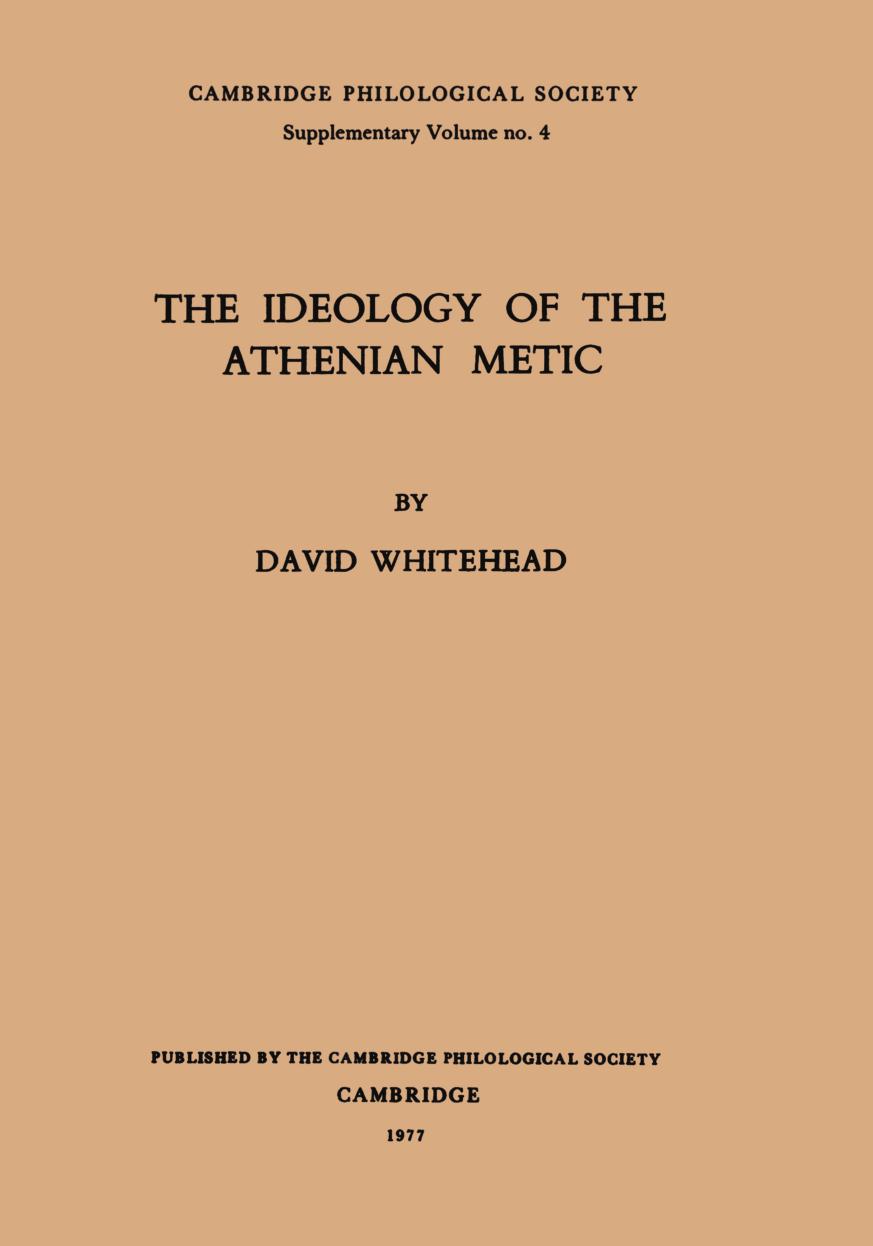The Ideology of the Athenian Metic by David Whitehead;

Author:David Whitehead;
Language: eng
Format: epub, pdf
Tags: -
Publisher: Casemate Publishers & Book Distributors, LLC
(vii) Metic and xenos â the âprivilegesâ of metic-status
We can now ask the modern orthodoxy two inter-related questions: what were the real differences between xenoi (parepidemountes) and metoikoi, and in what concrete ways was metic-status a privileged status?
The definition of the metic establishes a realistic framework. Even before the introduction of a âspecified timeâ the metoikia was intended to be the automatic destination of resident foreigners, and the progression was designed less to offer incentives of itself than to allow the whole machinery of concessions and responsibilities to come into play. Secondly, it should not be forgotten how many fundamental restrictions applied to all free non-citizens. Arche, epigamia, hierosune and enktesis were normally beyond the reach of metic and xenos alike; and the meticâs life was considered (in terms of penal deterrents) no more valuable than that of the xenos. And if the âbeforeâ and âafterâ stages are briefly compared, it will be seen that being a xenos â or, like the Sidonians, remaining one â had distinct advantages:
(a) Finance. Metics, once on the metoikion-lists, paid not only that but also (unless they were paupers) eisphora, and possibly liturgies too. But xenoi paid no taxes: the xenika tele would in practice fall on metics, and Wilamowitzâ eisphorai for xenoi are a myth.171
(b) Military service. Metics were liable. But there was no regular enlistment (volunteers apart) of non-residents: the Delium expedition (Thuc. 4. 90. 1) was a unique case, and in any event probably involved only men from allied cities.172 As for the fleet, both metics and xenoi could choose whether or not to earn (part of) their living at sea.
(c) Religion. Xenoi as well as metics benefited from the toleration of non-Hellenic cults, though the metic did have the advantage in the native cults of city and deme â not hierosune but limited participation. The xenos could see but not do.173
(d) Law. In theory the xenos is rechtslos, unrecognised by the courts except through the agency of the proxenos of his city (an Athenian citizen), whereas the metic has substantial Rechtsfähigkeit.174 Exceptions (it is customary to add) are men from cities in a symbola(i)-relationship with Athens, and â from c.350 â men involved in a dike emporike, which, as re-organised then, took no account of the status of the participants.175
But it has taken an historian, not a jurist, to realise that in the fifth century and the first half of the fourth â until, that is, the reformed dike emporike â (i) metics, (ii) men from symbola(i)-cities and (iii) men with individual judicial privileges (such as proxenoi) probably exhaust the main categories of foreigner to be found in Athens and Piraeus; âdès lors, sâinquiéter du sort âdes autres xenoiâ, câest sâintéresser, sinon à des fantômes, du moins à une minorité peu importanteâ.176 And even for this minority it is clear that to become a metoikos was no unmixed blessing. Even if he or his city had no special treatment in Athenian courts, the reformed dike emporike allowed the non-resident foreign
Download
The Ideology of the Athenian Metic by David Whitehead;.pdf
This site does not store any files on its server. We only index and link to content provided by other sites. Please contact the content providers to delete copyright contents if any and email us, we'll remove relevant links or contents immediately.
The Daily Stoic by Holiday Ryan & Hanselman Stephen(3109)
The Fate of Rome: Climate, Disease, and the End of an Empire (The Princeton History of the Ancient World) by Kyle Harper(2872)
People of the Earth: An Introduction to World Prehistory by Dr. Brian Fagan & Nadia Durrani(2619)
Ancient Worlds by Michael Scott(2492)
Babylon's Ark by Lawrence Anthony(2430)
Foreign Devils on the Silk Road: The Search for the Lost Treasures of Central Asia by Peter Hopkirk(2388)
The Daily Stoic by Ryan Holiday & Stephen Hanselman(2343)
India's Ancient Past by R.S. Sharma(2295)
MOSES THE EGYPTIAN by Jan Assmann(2275)
The Complete Dead Sea Scrolls in English (7th Edition) (Penguin Classics) by Geza Vermes(2135)
Lost Technologies of Ancient Egypt by Christopher Dunn(2111)
The Earth Chronicles Handbook by Zecharia Sitchin(2101)
24 Hours in Ancient Rome by Philip Matyszak(1973)
Alexander the Great by Philip Freeman(1960)
Aztec by Gary Jennings(1877)
The Nine Waves of Creation by Carl Johan Calleman(1783)
Curse Tablets and Binding Spells from the Ancient World by Gager John G.;(1768)
Before Atlantis by Frank Joseph(1740)
Earthmare: The Lost Book of Wars by Cergat(1715)
